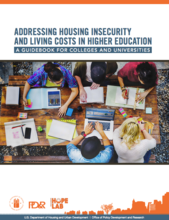Found 236 resources.
0
0
0
A Promising Approach to Improving Student Outcomes
Topics: Child welfare, Education, Funding, Mental health, Metrics, Place-based, Research, Youth
 Shared by Housing Is
on Jul 5, 2018
Shared by Housing Is
on Jul 5, 2018 0
0
0

Graduation rates in Arkansas have improved for all racial groups under this program
Topics: Cost effectiveness, Dual-generation, Education, Family engagement, Legislation & Policy, Low-income, Post-secondary, Racial inequalities, South, Youth
 Shared by Housing Is
on Jul 5, 2018
Shared by Housing Is
on Jul 5, 2018 0
0
0
Topics: Child welfare, Early childhood, Education, Mental health, Post-secondary, Research, Safety, South, Youth
 Shared by Housing Is
on Jul 5, 2018
Shared by Housing Is
on Jul 5, 2018 0
0
0
Chicago’s troubling homicide rate could be significantly reduced through a massive increase in state spending for Chicago schools.
Topics: Child welfare, Community development, Cost effectiveness, Education, Funding, Legislation & Policy, Low-income, Midwest, Research, Safety, Youth
 Shared by Housing Is
on Jul 5, 2018
Shared by Housing Is
on Jul 5, 2018 0
0
0
A Nashville elementary school takes a comprehensive approach to trauma-informed practices, creating a space where students feel known and supported.
Topics: Child welfare, Depression, Domestic violence, Education, Low-income, Mental health, Safety, Youth
 Shared by Housing Is
on Jul 5, 2018
Shared by Housing Is
on Jul 5, 2018 0
0
0
Topics: Community development, Education, Family engagement, Low-income, Midwest, Post-secondary, Research, Workforce development, Youth
 Shared by Housing Is
on Jul 5, 2018
Shared by Housing Is
on Jul 5, 2018 0
0
0
MDRC, a nonprofit, nonpartisan education and social policy research firm, released encouraging results from a demonstration, funded by Robin Hood, of two aligned interventions in New York City.
Topics: Early childhood, Education, Grade-level proficiency, Low-income, Metrics, Racial inequalities, Research, Youth
 Shared by Housing Is
on Jul 5, 2018
Shared by Housing Is
on Jul 5, 2018 0
0
0

Violent-crime arrests drop by 33 percent for program participants.
Topics: Child welfare, Criminal justice, Education, Low-income, Midwest, Mobility, Out-of-school time, Post-secondary, Racial inequalities, Research, Safety, Substance abuse, Workforce development, Youth
 Shared by Housing Is
on Jul 5, 2018
Shared by Housing Is
on Jul 5, 2018 0
0
0
Education leaders reconvened on Tuesday to continue discussing how to help kids by helping their parents. The approach, known as the “Two-Gen” method is based on data showing a child’s trajectory is largely determined by their parents’ stability.
Topics: Child welfare, Dual-generation, Education, Family engagement, Literacy, Low-income, School-readiness, Workforce development, Youth
 Shared by Housing Is
on Jul 5, 2018
Shared by Housing Is
on Jul 5, 2018 0
1
1
Researchers have shown — and teachers know — that schoolchildren exposed to neighborhood violence can have a tougher time learning, experiencing more stress and depression than their peers growing up in safe neighborhoods. But a Johns Hopkins University sociologist discovered that the consequences of neighborhood violence reach further than previously known, even spilling over to students who come from safe neighborhoods. Using crime and student data from Chicago, Julia Burdick-Will linked exposure to neighborhood violence to a drop in test scores, an effect that extended to students coming...
Topics: Attendance, Child welfare, Community development, Depression, Education, Health, Low-income, Mental health, Midwest, Out-of-school time, Post-secondary, Racial inequalities, Research, Youth
0
0
0

Poor children don't struggle in school because of their parents. They struggle because of poverty.
Topics: Attendance, Child welfare, Dual-generation, Early childhood, Education, Family engagement, Food insecurity, Grade-level proficiency, Housing, Legislation & Policy, Literacy, Low-income, Out-of-school time, Post-secondary, Racial inequalities, Research, School-readiness, Youth
0
0
0

Why do some neighborhoods appear able to launch effective local improvement initiatives, while others are more hampered by fragmentation and mistrust? Why can some communities mobilize diverse constituencies to influence public policy, while others cannot? Answers to these questions may be found in the specific patterns of collaboration that form among community organizations, and between these groups, schools, public agencies, and elected officials, according to MDRC, a preeminent social-policy research organization.
Topics: Asset building, Child welfare, Community development, Data sharing, Dual-generation, Education, Family engagement, Funding, Health, Housing, Legislation & Policy, Low-income, Metrics, Midwest, Mobility, Out-of-school time, Partnerships, Place-based, Preventative care, Research, Safety, Stability, Workforce development, Youth
0
1
1
The Council of Large Public Housing Authorities (CLPHA) hosted The Housing Is Summit in Washington, D.C., on May 3-4, 2018 with 300 partners across the housing, education, and healthcare sectors. Access video recordings of the Summit's keynote speakers (HUD Secretary Ben Carson, John Bridgeland, Matthew Morton), plenary panels (on topics that cut across sectors like anchor institutions, data collaboration, stability, and foundation investments), and select breakout sessions focused on the intersections of housing, education, and health.
Topics: Affordable Care Act, Attendance, Child welfare, CLPHA, Community development, Data sharing, Dual-eligibles, Dual-generation, Early childhood, Education, Funding, Grade-level proficiency, Health, Healthy homes, Homelessness, Housing, Legislation & Policy, Low-income, Medicaid / Medicare, Mental health, Metrics, MTW, Out-of-school time, Partnerships, Place-based, Preventative care, Racial inequalities, Research, School-readiness, Seniors, Stability, Substance abuse, Supportive housing, Sustainability, TA, Workforce development, Youth
 Shared by Steve Lucas
on May 23, 2018
Shared by Steve Lucas
on May 23, 2018 0
0
0
Increasingly, a wide range of entities—housers, educators, cities—are using data sharing as a way to increase effectiveness across systems. Data sharing exemplifies this community of practice’s intent to align systems to improve life outcomes for low-income children. We have many robust examples on the local level and this panel will discuss what data systems beyond local partners can look like and accomplish.
Dennis Culhane, Co-Principal Investigator, Actionable Intelligence for Social Policy, University of Pennsylvania School of Social Policy & Practice
Topics: Asset building, CLPHA, Data sharing, Education, Housing, Low-income, Metrics, Partnerships, Research
 Shared by CLPHA Admin
on Jan 8, 2018
Shared by CLPHA Admin
on Jan 8, 2018 0
0
0
This panel provides updates on the future of ConnectHome, the program’s partnership with Google Fiber, and what’s next for using data to assess the program, as well as lessons learned from Google Fiber’s ambitious initiative to provide free high-speed internet to housing authority residents.
Calvin Johnson, Deputy Assistant Secretary, U.S. Department of Housing and Urban Development
Erica Swanson, Head of Community Impact Programs, Google Fiber
Topics: Broadband, CLPHA, Education, Low-income
 Shared by CLPHA Admin
on Jan 8, 2018
Shared by CLPHA Admin
on Jan 8, 2018 0
0
0
Anchor institutions can provide invaluable expertise, as well as serve as reliable third party entities, especially in our resource-constrained environment. Chicago Housing Authority and the University of Chicago describe how their partnership has increased their efforts and made it more efficient.
Cassandra Brooks, Education Specialist, Chicago Housing Authority
Denali Dasgupta, Researcher, Chapin Hall, University of Chicago
Nick Mader, Senior Researcher, Chapin Hall, University of Chicago
Topics: CLPHA, Education, Housing, Low-income, Midwest, Partnerships, Place-based, Research, Stability
 Shared by CLPHA Admin
on Jan 3, 2018
Shared by CLPHA Admin
on Jan 3, 2018 0
0
0
James Cole, Jr., U.S. Department of Education General Counsel/Delegated the Duties of Deputy Secretary, gives a keynote speech at CLPHA's 2016 Affordable Housing & Education Summit.
Topics: CLPHA, Education, Housing, Legislation & Policy, Partnerships
 Shared by CLPHA Admin
on Dec 22, 2017
Shared by CLPHA Admin
on Dec 22, 2017 0
0
1

Topics: Education
 Shared by Cassandra Brooks
on Dec 12, 2017
Shared by Cassandra Brooks
on Dec 12, 2017 0
0
0
Topics: Education
 Shared by Cassandra Brooks
on Dec 12, 2017
Shared by Cassandra Brooks
on Dec 12, 2017 0
0
0
In Tacoma, Washington, and other U.S. cities, housing departments are collaborating with school districts to give low-income and homeless students a leg up.
Topics: CLPHA, Education, Housing, Pacific Northwest, Partnerships, Place-based, Stability
 Shared by Abra Lyons-Warren
on Sep 7, 2017
Shared by Abra Lyons-Warren
on Sep 7, 2017 0
0
0
Children may love the carefree days of summer, but many parents and educators often worry about the summer break from school. Why? Because, according to the Campaign for Grade-Level Reading and the National Summer Learning Association, students from low-income families lose an average of more than two months in reading achievement during the summer. This serious loss of previously learned skills is called the “summer slide.” What can be done to help maintain academic achievement over the summer for all children?
Topics: Education
 Shared by Rebecca Friendly
on Aug 16, 2017
Shared by Rebecca Friendly
on Aug 16, 2017 0
0
0

Topics: CLPHA, Data sharing, Education, Housing, Low-income, Pacific Northwest, Partnerships, West Coast
 Shared by CLPHA Admin
on Jul 19, 2017
Shared by CLPHA Admin
on Jul 19, 2017 0
0
0

Topics: CLPHA, Education, Housing, Low-income, Partnerships, Post-secondary, West Coast, Workforce development, Youth
 Shared by CLPHA Admin
on Jul 19, 2017
Shared by CLPHA Admin
on Jul 19, 2017 0
0
0

Topics: CLPHA, Education, Health, Housing, Low-income, Midwest, Partnerships
 Shared by CLPHA Admin
on Jul 19, 2017
Shared by CLPHA Admin
on Jul 19, 2017 0
0
0

Topics: CLPHA, Education, Housing, Midwest, Partnerships
 Shared by CLPHA Admin
on Jul 19, 2017
Shared by CLPHA Admin
on Jul 19, 2017 